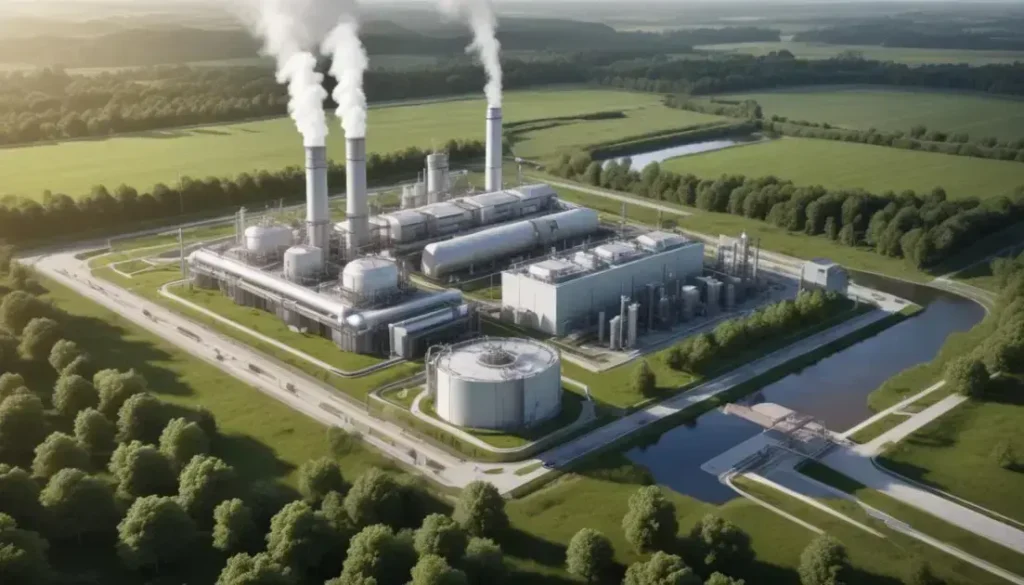Carbon credits play a crucial role in the UK market by allowing businesses to offset their emissions and contribute to sustainability efforts, presenting both opportunities and challenges for compliance and competitive advantage.
The inclusion of carbon credits through innovative DAC technology is changing the landscape for businesses aiming to reduce emissions. How can UK firms leverage this?
Understanding DAC and its role in carbon removal
Direct Air Capture (DAC) technology represents a pivotal advancement in the fight against climate change. It works by extracting carbon dioxide directly from the atmosphere, presenting a tangible solution to reduce global warming. By harnessing this innovative approach, businesses can effectively offset their emissions and contribute to a sustainable future.
The role of DAC in carbon removal is critical, particularly as governments and organisations strive to meet ambitious emission reduction targets. As regulatory frameworks evolve, firms utilising DAC technologies stand to gain a competitive advantage. They can not only enhance their sustainability credentials but also align with investor expectations for responsible business practices.
Moreover, the economic potential of DAC is significant. It opens up new markets for carbon credits, enabling businesses to monetise their sustainability efforts. However, integrating DAC into existing operations involves considerations such as energy consumption, costs, and the need for supportive policies. Understanding these factors is crucial for businesses aiming to leverage DAC optimally.
In summary, DAC not only addresses critical environmental challenges but also represents a strategic opportunity for UK enterprises, making it essential for stakeholders to comprehend its mechanisms and implications thoroughly.
Implications for UK businesses in the carbon market
As the demand for carbon credits increases, UK businesses must navigate a rapidly evolving carbon market. This shift presents both challenges and opportunities for firms seeking to enhance their sustainability profiles. By understanding market dynamics, businesses can position themselves effectively to leverage carbon trading.
The move towards a net-zero economy creates an environment where companies that adopt sustainable practices stand to benefit significantly. Participation in the carbon market allows businesses to gain financial rewards for reducing their emissions or investing in carbon capture technologies. Such strategies not only contribute to environmental goals but also enhance corporate reputation.
However, entering this market requires careful consideration of regulatory frameworks and compliance requirements. UK businesses must stay informed about the evolving legislation surrounding carbon trading. This knowledge is essential for avoiding potential pitfalls and ensuring that their efforts align with government initiatives.
Moreover, firms should explore collaborations within the industry to share knowledge and best practices. Engaging with stakeholders, including government bodies and environmental organisations, can foster innovation and drive advancements in carbon management strategies. By proactively participating in the carbon market, UK businesses can not only fulfil regulatory obligations but also cement their position as leaders in sustainability.
In conclusion, the path forward for UK businesses
The integration of Direct Air Capture (DAC) technologies and participation in the carbon market offers UK businesses a unique opportunity to lead in sustainability. By actively engaging in these innovative practices, companies can significantly reduce their carbon footprint while enhancing their reputation.
Understanding the regulatory landscape and collaborating with industry stakeholders will be crucial as the market evolves. Businesses that adapt quickly stand to gain a competitive edge and contribute positively to the environment.
Ultimately, the proactive adoption of carbon management strategies is not just an obligation, but a chance to shape a sustainable future for the UK economy. Embracing these changes can set the stage for long-term success and a greener planet.
Frequently Asked Questions
What are the main benefits of using Direct Air Capture technologies?
Direct Air Capture (DAC) technologies offer the opportunity to significantly reduce carbon emissions by removing carbon dioxide directly from the atmosphere, helping businesses meet sustainability goals.
How can UK businesses participate in the carbon market?
UK businesses can participate in the carbon market by investing in carbon credits, reducing their emissions, or implementing carbon capture technologies to earn credits that can be traded.
What challenges might businesses face when entering the carbon market?
Businesses may face challenges such as navigating complex regulations, understanding compliance requirements, and managing the costs associated with implementing carbon reduction strategies.
How does participation in the carbon market improve a company’s reputation?
Engaging in the carbon market demonstrates a commitment to sustainability, which can enhance a company’s reputation among consumers, investors, and regulatory bodies.
What steps should businesses take to adopt DAC technologies effectively?
To adopt DAC technologies effectively, businesses should start with pilot projects, assess their impact, and remain informed about the latest advancements and regulatory changes in carbon capture.
Is collaboration important in developing carbon management strategies?
Yes, collaboration with industry stakeholders, including government and environmental organisations, can provide valuable insights and drive innovation in carbon management strategies.


